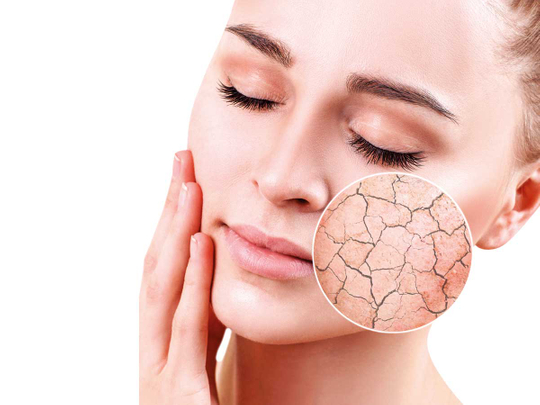
How often should I exfoliate my skin in the winter season?
Dr Mustafa Marai: While you should exfoliate your skin all year round, it’s critical to exfoliate regularly during winter as our skin becomes very dry. However, over exfoliation can cause skin irritation, leading to inflammation and other skin issues. To keep your skin soft, exfoliate two to three times a week if you have normal skin and once a week, if you have sensitive skin. Don’t forget to apply moisturiser after you exfoliate.

Over exfoliation can cause skin irritation, leading to inflammation and other skin issues.
What kind of skincare regimen should I adopt?
Dr Rahul Chaudhary: Fortunately, in the UAE, we do not experience the bitter chilly winters as seen by many countries in the world. However, lower temperatures, wind and hot showers plus the low humidity dehydrate our skin more than normal.
We should use a thick cream based moisturiser for our face and body during winter. Avoid foam-based face wash, replacing it with gentle creamy cleansers. Continue to use a cream-based SPF to give dual effects of moisturiser and sun protection. Add a night cream to your skincare routine if you don’t already do that and also remember to wear a lip balm whenever you are outdoors. Avoid over-exfoliating your face, use scrubs with caution, and drink lots of water to hydrate your skin. Go for a hydrating mask and try a facial oil and eye cream for extra hydration.

Avoid foam-based face wash, replacing it with gentle creamy cleansers. Continue to use a cream-based SPF to give dual effects of moisturiser and sun protection.
How often do I need to go for facials?
RC: It all depends on the type of your skin. If your skin is very dry, red and irritated then refrain from facials in winters. For those with normal to oily skin, gentle facials every month, done by professionals, are good.
The sun during winter is not so harsh. Do I really need to wear sunscreen every day?
Dr Rohini Mathias: Although the amount of UVB, spectrum of sunlight that burns our skin, is less during the winter, the amount of exposure to UVA, responsible for certain allergies and sunlight-induced skin ageing, remains the same. You do need to apply sunscreen during winters as well as on cloudy days.
The SPF mentioned on your sunblock is only a measure of how much UVB protection it offers you. It is prudent for you to generally use a sunscreen with an SPF of 30. But in winter, as UVB is not the main culprit for skin damage, you can opt for a broad spectrum sunscreen that offers protection to your skin against both UVA and UVB.
Moisturising is critical during winter. Could you give us some tips on choosing the right moisturiser?
RM: A good moisturiser should effectively reduce the loss of water through the skin, while restoring the oil barrier. It should be hypoallergenic, non-sensitising, fragrance free and noncomedogenic that doesn’t trigger acne. It should be absorbed fast and provide immediate but sustained hydration while being cosmetically acceptable. There is unfortunately no single ideal moisturiser. Ultimately, it’s a personal choice based on what works best for you.

A good moisturiser should effectively reduce the loss of water through the skin, while restoring the oil barrier.
What are the best ways to prevent winter acne?
RM: Managing acne in people with dry skin is indeed a challenge as many medications used in the treatment worsens dryness. Maintaining the optimal lipid barrier of the skin is critical in treating acne. Cleanse your face with luke-warm water twice a day using a gentle detergent-free and fragrance-free cleanser. Use a non-comedogenic moisturiser and sunscreen to control breakouts.
What are the best ways to prevent rashes?
RC: As temperatures drop, our skin becomes dry, sometimes leading to rashes. Always take showers in luke warm water, using soap-free cleansers. Moisturise immediately after the shower with thick cream based moisturiser. And you must moisturise at least two to three times a day to keep it soft. Drink plenty of water to hydrate your body.
Take vitamin D supplements if your are deficient in it for optimal skin protection. However, if you get excessive itching and severe redness, try using a mild cortisone cream for a few days. You can also consult a dermatologist if problems persist












